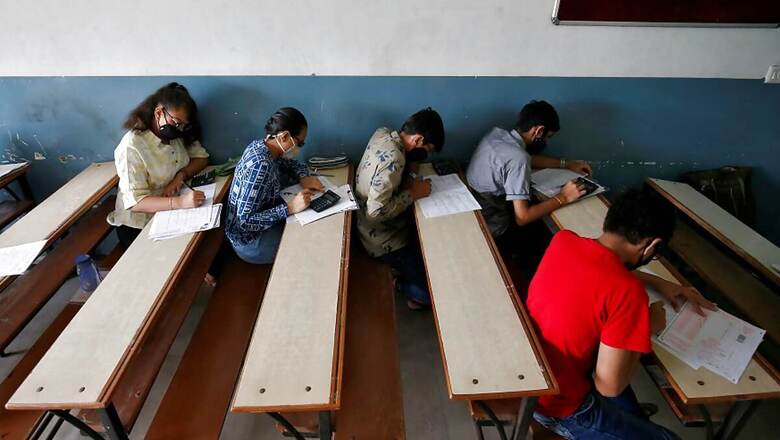
views
Even as chorus grows against holding the NEET, JEE exams in September amid Covid-19, the National Testing Agency (NTA) is all set with precautions and preparations for aspirants.
At an additional cost of Rs 13 crore, a plethora of equipment, protective gear, sanitisers, among other things, is to be acquired under the NTA’s blueprint for the 660 test centres for JEE (Main) exams.
A report by the Indian Express states arrangements will be made for ten lakh masks, 10 lakh pairs of gloves, 1,300 infrared thermometer guns, 6,600 litres of hand sanitiser and disinfectant liquid each, 6,600 sponges, and 3,300 spray bottles. Three thousand and three hundred cleaning personnel have also been engaged for the exams.
The JEE (Main) exam is scheduled to be held from September 1-6, for engineering aspirants. The report states that about 8.58 lakh aspirants have registered for the exam, which will be supervised by 1.14 lakh invigilators.
The number of test centres has been increased from the previous 570, to ensure that students sit in alternative seats and can practice social distancing. While the number of shifts has been upped from 8 to 12, the number of students per shift has also been reduced from 1.32 lakh to 85,000.
NTA Director-General Vineet Joshi told IE that earlier, it was planned to assign two invigilators for 30 students, and that now it had been brought down to two for 15. This was why the requirement of invigilators had doubled to 1.14 lakh, he added.
While the timings have been slightly changed for proper sanitisation of the premises, the exam will take place in two shifts of three hours each, daily. Joshi said that the first shift would be held from 9 am to noon and the second shift will start at 3 pm. The gap between the timings would help provide time for sanitising the computer labs for the second shift.
To avoid crowding, the aspirants have also been assigned time slots for reporting at the centres. Thus, only a maximum of 40 students can report in one 20-minute slot.
These Covid-19 precautions will cost NTA an extra Rs 150 per aspirant, Joshi said. Before the onset of coronavirus, the agency would have spent Rs 400 per candidate for JEE (Main), he added.
The Standard of Proceedure has been developed by IT major Tata Consultancy Services in association with the All India Institute of Medical Sciences (AIIMS) and Public Health Foundation of India, the report by IE states.
“For ensuring social distancing outside the examination hall, the entry and exit of candidates has been staggered,” NTA had said in a statement.
The aspirants will have to submit a self-declaration form with a photograph, stating that they have not tested positive for the novel coronavirus and have not experienced any symptoms like fever, cough or breathing-related issues in the recent days. Their Aarogya Setu app status will also be verified.
It will be mandatory to wear face masks and gloves. Students will also have to carry a personal water bottle and hand sanitiser to the exam centre. The students will not be allowed to crowd and stand within the circles marked at the centre.



















Comments
0 comment